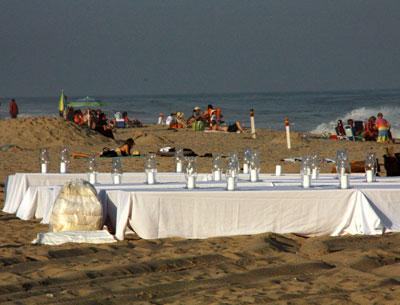Business on the Beach Gets the Business

The East Hampton Town Board’s recent granting of an “exclusive commercial mass-gathering permit” to a firm that plans to offer surfing lessons on three town-owned beaches has brought to a boil an issue that’s been simmering for years on the town’s back burner.
The East Hampton Town Trustees, who own and manage most of the town’s beaches other than in Montauk, have long opposed business activities on the sands, seeing it as their paramount responsibility to provide free access to perhaps the town’s most valuable resource. Last week the trustees agreed that the commercial use of town beaches should be prohibited, and asked town board members to join them in talks to come up with an acceptable approach — if there is one.
On April 5, the town board unanimously agreed to allow the Main Beach Surf and Sport shop to give surfing lessons at beaches off Beach Lane in Wainscott and Napeague Lane in Amagansett, and at Ditch Plain in Montauk. Each lesson was expected to draw 10 or 15 students, with the locations to be changed on a rotating basis.
The surf shop submitted its application to the trustees as well. It was denied. The trustees have also received a request from East Hampton Volleyball, which would like to hold pay-for-play league play on Indian Wells and Atlantic Beaches in Amagansett.
Last Wednesday, Diane McNally, the trustee clerk, sent a memo to Town Councilwoman Theresa Quigley advising her that “at this time, this board does not support the issuance of exclusive commercial mass-gathering permits on public lands. The trustee beaches committee would welcome an opportunity to meet with you to further discuss this issue.”
“There’s going to be a problem,” said Nat Miller, a trustee, during the nine-member board’s April work session last week.
“We can see the writing on the wall,” Ms. McNally said.
“We don’t want the beach to become a commercial enterprise,” echoed Joe Bloecker.
Several years ago, the trustees drew a line in the sand when it came to out-of-town organizations seeking to hold events, particularly a growing number of benefits on town beaches.
“Just today we got a request from a magazine from away that wanted to use the beach to hand out sample products,” Ms. McNally said Tuesday, adding that the requests from out-of-town organizations kept growing. “How do you say no to a benefit for children’s leukemia? But it was getting huge.”
Trustees now limit benefit gatherings to resident groups such as the annual Sand Castle competition in Amagansett.
During a phone interview, the trustee clerk said the issue was complicated by the fact that regulations defining the use of public beaches for mass gatherings have a similar history as regulations for beach driving and shellfish harvesting. That is, these regulations, as they appear in the town code, are a joint creation — brought about by hard-fought compromises — of the trustees and the municipal government.
Trustees have legislative powers, but no enforcement powers. From their point of view, having their stance on public resources reflected in the town code is a way of enforcing it. The joint regulations have also helped to preclude squabbles over jurisdiction.
During last week’s meeting, Ms. McNally said she had no problem with beach gatherings of over 50 people, such as weddings or picnics, as long as no structures were involved.
“It’s the exclusive mass gatherings that started to tip the scale,” she said. “The [town] board just approved surfing lessons on the beach, but what happens when the public shows up and wants to put down a towel on public property? It’s a conflict that should be addressed before it’s here.” Ms. McNally added that the question could “potentially” become a problem vis-a-vis the town board unless something can be worked out.
John Courtney, the trustees’ attorney, reminded the board that if push came to shove, “It’s their code, but it’s our property. You let this happen, or not let it happen. You can do what you want to do. You are not bound by their code. You can say no because you say no, not because of what their code says.”
Ms. McNally urged that a committee of trustees meet with town board members. “Throw it on the table. We don’t have a problem yet. Let’s see if we can work it out.”
During a town board work session on Tuesday, Councilwoman Quigley suggested the board not allow commercial activity on any of the town’s protected bathing beaches. “On the other hand,” she said, “paddle-boarding is nice, surf lessons are nice and should be encouraged, but can’t we carve out a place?”
Her suggestion followed a lengthy discussion about commercial versus public use of beaches brought on by an application from a group seeking to conduct paddle board tours of Lake Montauk, Fort Pond Bay, Napeague Harbor, and Georgica Pond throughout the summer.
Councilman Peter Van Scoyoc said “cordoning off” sections of beach for commercial use “was not a precedent we want to set.”
Supervisor Bill Wilkinson spoke against the concept as well. Councilman Dominic Stanzione said, “I’m torn here. We are a tourist town.”
“Yes, but we have a second-home community and they pay taxes,” Ms. Quigley said.
“These are more like commercial licenses,” Mr. Van Scoyoc said of the “exclusive mass-gathering” permits.
Mr. Wilkinson asked if exceptions could be made for nonprofit organizations, and Ms. Quigley suggested asking the town’s ocean rescue guards to suggest possible locations for such commercial activities.
Apparently no one on the town board had read the trustee clerk’s memo before Tuesday’s session took place.
